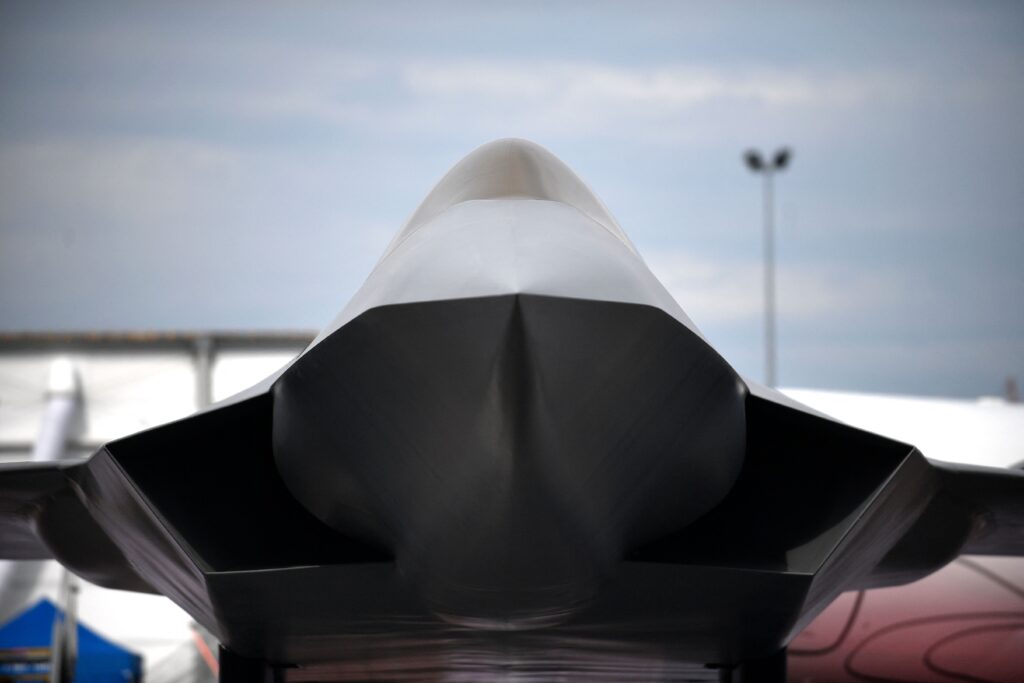
This photograph taken on June 18, 2023 shows a mock-up of the European New Generation Fighter (NGF) for the Future Combat Air System (FCAS) under development by Dassault Aviation, Airbus and Indra Sistemas during the International Paris Air Show at the ParisLe Bourget Airport. (Photo by JULIEN DE ROSA / AFP) (Photo by JULIEN DE ROSA/AFP via Getty Images)
Disputes among partners in the French-German-Spanish FCAS (Future Combat Air System) program have been overstated, according to Brig. Gen. Phillipe Suhr, the French Air Force’s representative for the initiative. Speaking at the International Fighter conference in Rome, Suhr emphasized that all nations involved remain committed to the project, which aims to replace France’s Rafale and Germany’s Eurofighter aircraft by 2040.
“There are differences but don’t believe all you are reading,” Suhr stated. He assured that efforts are being made to resolve ongoing disagreements and that the program will proceed as planned. “It is important to deliver in the 2040s,” he added, highlighting the urgency for a modernized air combat solution.
The FCAS program was launched in 2017 by France and Germany, with Spain joining later. In recent months, tensions have risen, particularly regarding project control. French prime contractor Dassault Aviation has been advocating for a larger share of the project, which has led to disputes with the other partners. Airbus CEO Guillaume Faury recently suggested that if Dassault is dissatisfied with its current stake, it could withdraw from the initiative. “So if they’re not happy with what was decided and they don’t agree to continue in this setup, they are free to decide to move out of FCAS,” Faury remarked.
Suhr downplayed the extent of the disagreements, asserting that Dassault’s ambitions for control have been misrepresented. “When you read Dassault wants 80 percent, it is not reality,” he clarified, indicating that the partnership remains focused on collaborative progress.
Comparative Progress of GCAP Fighter Program
As the FCAS program faces challenges, the parallel sixth-generation fighter initiative, known as GCAP (Global Combat Air Programme), appears to be advancing more smoothly. This project is a collaboration among Italy, the United Kingdom, and Japan, and has recently established three industrial consortia to oversee its development.
In a conference call with analysts, Roberto Cingolani, CEO of Leonardo, Italy’s lead contractor for GCAP, announced that the company expects to secure over €1 billion in national contracts related to the fighter program by December. “Our competitors are slowing down,” Cingolani noted, contrasting GCAP’s trajectory with that of FCAS.
Col. Antonio Vivolo, the senior technical representative for GCAP at the Italian Ministry of Defence, articulated Italy’s perspective on the importance of maintaining technological sovereignty. He underscored the necessity for nations to retain a degree of autonomy in rapidly evolving technological landscapes, even while collaborating with international partners.
“The goal is not only to obtain a new fighter; the goal is to obtain and keep technological and industrial sovereignty so that when scenarios, threats, and partners change, we can reconfigure our capability without renegotiating our freedom of action with a third party,” Vivolo explained during his address at the Rome conference. He emphasized that without substantial sovereignty, the sixth-generation initiative could merely become an attractive concept largely governed by external forces, which he deemed unacceptable.
The contrasting developments in the FCAS and GCAP programs highlight the complexities of international defense collaborations. As nations strive to enhance their military capabilities, the outcomes of these initiatives will significantly impact European and global defense strategies in the coming decades.







